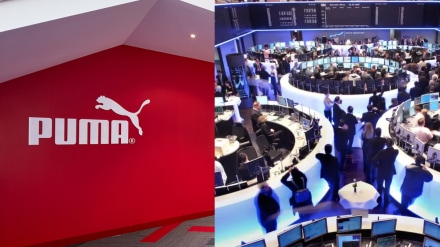Just a few weeks ago, Puma looked like it was slowing down. On October 30, 2025, the company reported its Q3 results and they were disappointing.
Sales fell 10.4% on a currency-adjusted basis, while reported sales dropped 15.3% to €1.96 billion. Puma explained it had entered a reset phase, cutting lower-quality wholesale distribution and reducing promotions while working through high inventory levels. In fact, investors didn’t find much to cheer.
But on November 27, 2025, everything looked different. Around 09:21 PM, Puma shares traded near €19.60 on XETRA, Germany stock exchange, up about €2.60 from the prior session, a single-day gain of roughly 15.3%, as reported by Yahoo Finance.
Bloomberg reported the Puma shares surged as much as 14% in Frankfurt trading since September.
Anta Sports enters the picture
The excitement comes from Hong Kong-listed Anta Sports Products Ltd. valued at around $31 billion reportedly weighing a takeover of Puma.
According to Bloomberg, Anta has been working with advisers and could partner with a private equity firm to push forward. Competitors may also want in. Li Ning Co. is reportedly talking to banks about financing, and even Asics Corp. from Japan has been mentioned as a potential bidder.
Anta has a major deal-making history. In 2019, an Anta-led consortium that included FountainVest Partners bought Amer Sports for $5.2 billion. Amer owns brands like Salomon and Arc’teryx and later launched an IPO in New York, with Anta staying on as the biggest investor.
A new CEO’s vision
The timing could not be more interesting. Puma has recently gotten a new CEO, Arthur Hoeld, formerly of Adidas, who has a plan to return the company to growth by 2027.
Talks around a possible takeover are still at a very early stage, and it’s not yet known which bidder, if any will actually move forward. One big challenge could be the price.
The Pinault family of France, Puma’s largest shareholder, may expect a valuation that potential buyers are not willing to pay, as reported by Bloomberg.
Before Thursday’s rally, Puma’s stock had fallen 62% in Frankfurt this year, leaving the company with a market value of about €2.5 billion ($2.9 billion).
The Pinault family controls 29% of Puma through its holding company Artémis, according to last year’s annual report.
Puma’s restructuring phase
Puma announced last month that it plans to cut 900 additional jobs as part of a major restructuring. The company wants to concentrate more on its strongest categories, running, football and training and refresh its marketing so products have stronger, more engaging stories from the moment they are designed.
The aim is clear, Puma wants to get back to growth by 2027 and position itself firmly among the top three sports brands in the world, as reported by Reuters
